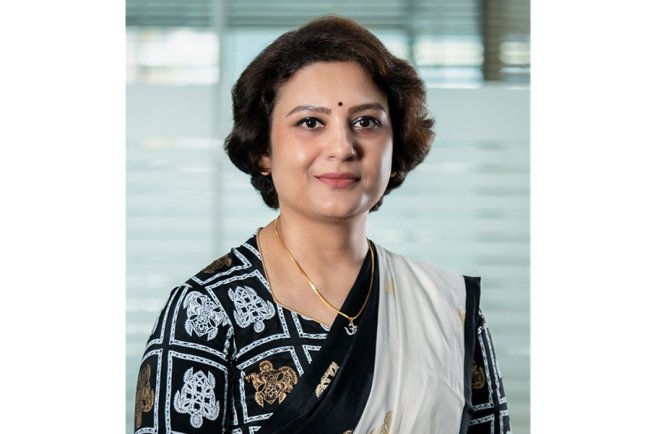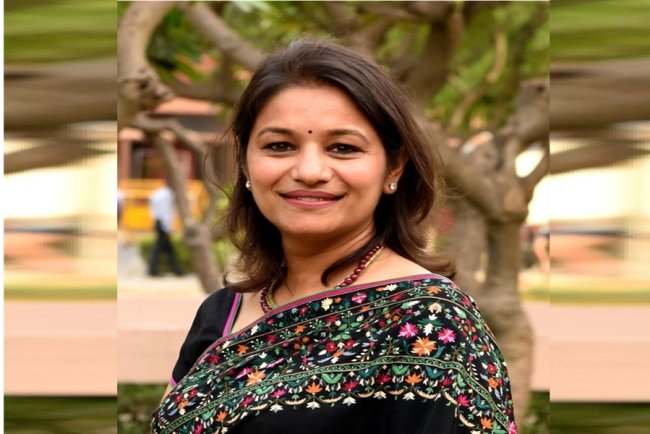From Human Capital To Climate Justice: Arthan’s Founders On Building Equitable Systems
With decades of experience between them, Satyam Vyas and Anchal Kakkar—co-founders of Arthan have built platforms that go beyond job matching or capacity building—they are cultivating ecosystems

In an interview with ResponsibleUs, Satyam Vyas and Anchal Kakkar—co-founders of Arthan and key changemakers behind Climate Asia and EquiLead—share how they are reimagining how talent, equity, and climate justice intersect in the Global South. With decades of experience between them, Satyam and Anchal have built platforms that go beyond job matching or capacity building—they are cultivating ecosystems. While Arthan strengthens the impact sector through human capital development and organizational support, Climate Asia ensures community-led climate action is resourced and recognized. Anchal is addressing persistent gender gaps in leadership by helping institutions turn equity goals into practice via EquiLead. Together, their work spans over 1,500 mission-driven organisations and over a million individuals, all driven by one belief: systemic change begins with the people closest to the problem.
Satyam Vyas
What inspired you to launch Arthan and Climate Asia, and how do they complement each other in addressing human capital and climate challenges?
The journey began with a simple but pressing question: Where do purpose-driven professionals go to build meaningful, long-term careers in social impact? Arthan was created to answer this; building pathways, platforms, and leadership ecosystems that nurture mission-aligned talent across India and the Global South. Our initial few years led us to build on our knowledge and networks across multiple domains within impact.
However, as our work deepened over the years, the climate crisis stood out and one truth became undeniable: the climate crisis is fundamentally a human capital crisis. Communities most vulnerable and affected are least heard and have the least often have the least voice, funding, or institutional support.
Climate Asia emerged as a natural extension of our mission, rooted in the belief that those living the climate crisis must lead its solutions. While Arthan strengthens the backbone of the impact workforce, Climate Asia ensures grassroots civil society leaders, especially women and iIndigenous communities, shape climate adaptation and justice efforts from the frontlines.
Together, they form a reinforcing loop: talent drives transformation, and transformation demands empowered talent.
2. What specific initiatives under Climate Asia are helping communities tackle climate change?
We center community leadership in climate action through flagship initiatives:
Climate Asia Fund: Identifies and supports grassroots innovations in agriculture, water, and energy resilience, helping civil society organisations (CSOs) transition from grant dependence to systems leadership.
Mitti Ki Baatein: A storytelling platform transforming lived experiences into policy-shaping narratives.
Digital Learning & Organisational Development (OD) Support: Vernacular, on-demand tools in Monitoring, Evaluation & Learning (MEL), compliance, governance, and leadership help small CSOs scale with credibility.
Climate Secretariat: Anchoring state and national secretariats to integrate climate resilience into economic planning, design incentives, and enable grassroots-led implementation at scale.
Gender Accelerator Program : A 6 month, cohort based initiative that supports CSOs embed gender equity into their organisation development, leadership structures, strategic planning and program design.
Do you have any data on their environmental or community-level impact?
Our community-led models deliver measurable, replicable outcomes:
● In Odisha, women farmers co-developed soil health mapping tools now informing district plans and catalyzing public-private partnerships.
● In Assam, flood-resilient bamboo structures designed by local collectives have reduced climate disaster damage and are scaling across districts.
● Through our Climate Talent Initiative, we have trained over 100 CSO leaders now leading climate programs, convening state dialogues, and serving on climate committees, while building dignified, skilled climate careers.
Since inception, how many individuals or organizations have Arthan and Climate Asia supported?
Since inception in 2017, Arthan and Climate Asia have:
● Strengthened 1,500+ mission-driven organizations.
● Reached 1 million+ individuals through CSO partners.
● Engaged additional 1 million individuals navigating social impact careers with tools, networks, and pathways.
How many job placements or career opportunities have been facilitated through your platforms?
Arthan has facilitated 5,000+ job placements across the social impact and climate sectors, with roles including program managers, MEL specialists, fundraisers, climate analysts, and senior leadership hires.
Salaries typically range from INR 15–50 lakhs per annum, and our placement candidates retain a 20–25% higher retention rate than the sectoral average.
How many CSO professionals or organizations have benefited from your capacity-building programs? Any success stories?
We have directly supported 200+ organizations through accelerators, digital toolkits, OD, and capacity-building labs.
Examples: 1: WORD (Odisha) - Bringing Back Traditional Millets
WORD in Odisha shows what's possible when local groups get the right support. This organization works across three districts—Kendujhar, Dhenkanal, and Deogarh—helping communities grow traditional millet varieties that had nearly disappeared. Since joining our program, WORD has grown from working with 50 women farmers to 609, now reaching 5,033 households with organic farming and land restoration work. They've helped villages create water management systems, set up disaster preparedness plans with practice drills, and strengthen their internal organization. While they're still working on some technical aspects and improving their grant applications, the dramatic increase in farmers and families they're helping shows how much stronger they've become at planning and community organizing since completing our year-long program in December 2023.
Example 2: Seba Jagat (Odisha) - Turning Farm Waste into Solutions
Seba Jagat in Odisha's Kalahandi district are the first in their district to make biochar—a soil improver—from farm and forest waste that would otherwise be burned or thrown away. The organization has also started tree-planting projects using seed balls, helped farmers switch to organic methods, and is exploring carbon credit programs and clean energy options. They're even making a film about climate justice to spread their message further. Their work has attracted funding of ₹1.15 crores through two grants, showing how innovative approaches incorporated through our program can draw financial support.
Example 3: SSEVS (Bihar) - Reaching 22,000 Farmers
SSEVS in Bihar demonstrates the scale of impact possible through our support programs. This organization now advises 22,000 farmers on climate-smart practices, including sustainable fish farming, organic makhana (fox nut) cultivation, and using a simple water tube tool that helps reduce harmful emissions from overused fertilizers. They've trained local women to manage fish ponds sustainably and partnered with the government's agricultural extension center to improve farming techniques. The organization has also created a mapping manual to help make government rural employment programs more climate-focused. Since completing our program in December 2023, SSEVS has been able to reach farmers with advice in Hindi through various channels, showing how building an organization's core strength enables them to serve their communities at scale.
How are you addressing gender equity through your work?
Equity is foundational, not optional. EquiLead: Our flagship initiative is working on building the capacity of CSOs to embed gender equity in their systems, processes, behaviours and culture. EquiLead also caters to a community of women leaders across the Global South enabling them to identify, access and avail leadership opportunities, mentorship and networking opportunities. closely Scaling across Asia to strengthen governance, fundraising, and influence skills among women and gender-diverse climate leaders. Over 50% of CSO partners are women-led or majority women-staffed. Gender-lens investing principles are integrated across climate finance and program design.
Can you share user or traffic numbers for your digital platforms?
We receive 500,000+ annual users across our digital platforms and social media
Who are your key partners, and how have these collaborations amplified your impact?
Funders: Growald Climate Fund, Gates Foundation, Co-Impact and others back our systems-change approach.
Practitioners: From farmer collectives to agri-tech firms, we co-designing scalable models.
Policy networks: Our partners serve on state adaptation committees and national climate task forces.
Which regions in the Global South are you most active in, and where do you see the greatest need for your work?
Currently active in India, Indonesia, and the Philippines, with a goal to reach Pan-India by 2030.
We prioritize regions with layered vulnerabilities and untapped leadership, investing, amplifying, and stepping aside to let communities lead.
What are your key priorities over the next three years?
Aligned with the Climate Asia Fund’s mission to build resilient, community-led climate action across Asia, our priorities for 2025–2028 are:
● Scaling Climate Leadership Across Asia: Launch the Pan-Asia Climate Fellowship through Climate Asia Fund to train 500+ grassroots, iIndigenous, and youth leaders in adaptation, systems thinking, and policy advocacy.
● Advancing Gender Equity in Climate Action: Scale EquiLead across South and Southeast Asia to embed gender equity into climate institutions, finance, and governance.
● Mobilizing Climate Finance for Frontline Communities: Unlock $100 million in catalytic climate finance for community-led solutions by building regranting platforms, policy toolkits, and state finance mechanisms.
● Building System Infrastructure for Climate CSOs: Establish a regional backbone infrastructure through the Climate Asia Fund, providing OD, MEL, compliance, and digital support to enable CSOs to scale credibly.
● Driving State and National Climate Action: Anchor state and national Climate Secretariats and Labs to integrate climate into economic planning, crowd in private capital, and enable grassroots-led implementation.
Our 2028 vision: A locally rooted, globally connected, structurally just climate movement in Asia, powered by communities and resourced at scale through the Climate Asia Fund.
Anachal Kakkar, Co-Founder of Arthan and Equilead
What motivated you to co-found Arthan in 2016, and how has your vision evolved over the years?
Prior to Arthan, my work in the capacity building space in the development sector, brought forth the observation that apart from funding, the area where most CSOs struggle is in finding the right talent. This coupled with my own struggles in identifying organisations that support development sector professionals identify and access relevant job opportunities led me to relate to the concept of Arthan that Satyam was working on at the time.
With Arthan, I got the opportunity to build on an initiative that creates space for individuals to build meaningful careers in social impact, while also helping organizations find the right people to advance their missions.
Over the years, our vision has expanded to look beyond hiring talent to also enabling organisational development support to CSOs along with thought leadership work through knowledge pieces and convenings- leading Arthan to become a leader as an ecosystem enabler- bringing together relevant stakeholders to convene, deliberate and work towards actionable solutions. We have also deepened our focus on climate and gender equity.
How does Arthan address systemic gaps in equity and inclusivity within the impact ecosystem? Are there measurable changes in the diversity of leadership or hiring practices you've observed?
Through our organisational development ( OD ) work we have worked closely with CSOs to identify , audit and improve their DEI practices, from working towards inclusive job descriptions to equitable hiring panels.
Further, we launched our flagship Gender Accelerator Program ( GenAP) as a part of the EquiLead initiative. GenAP is a 6 month, cohort based initiative that supports CSOs embedding gender equity into their organisation development, leadership structures, strategic planning and program design.
Hence, through EquiLead and our OD work, we are seeing more institutions commit to tracking gender-disaggregated data and rethinking leadership pipelines to ensure equity and diversity.
What sparked the launch of EquiLead, and how is it helping organisations build truly inclusive leadership pipelines?
EquiLead was launched with the realisation that the ratio of women to men drastically falls in organisations in the impact sector as one moves from entry level positions to senior leadership. This is even prevalent in organisations with inclusive systems and policies in place. Hence, EquiLead was launched to accelerate women's leadership in the impact sector while building gender equitable organisations of the future. Further, EquiLead also looks into supporting institutions that have DEI goals but lack the tools and frameworks to make them actionable. EquiLead offers structured interventions to enable organisations to become inclusive in their systems, processes, behaviours and culture. Beyond training, EquiLead also focuses on implementation support, so that change moves from policy to practice.
What are some of the most common workplace gaps EquiLead identifies, and how do you help organizations address them—from policy to practice?
We often see gaps in inclusive hiring, workplace accessibility, and feedback systems. EquiLead helps address these through custom workshops, inclusion policy development, and leadership accountability frameworks. We also guide partners on setting up metrics that measure not just diversity in numbers, but equity in experience.
How has your experience in both corporate consulting and the social sector shaped the way you approach leadership and systems change?
It has taught me that lasting change doesn’t come from top-down mandates but from culture shifts rooted in listening and co-creation. Consulting gave me tools for structured problem-solving; the social sector gave me perspective on the human cost of inequality. I try to bring both lenses to every intervention we design.
How has your MBA from Oxford and fellowship experience influenced your strategy for building sustainable, equitable organisations?
Those experiences broadened my understanding of global systems and introduced me to peers working on transformative ideas across various sectors. They reinforced the importance of ecosystem thinking—understanding how change in one part of the system influences another. It is a mindset we try to embed in everything we build at Arthan.
What are the next milestones for Arthan and EquiLead? Where do you see the most pressing opportunities for transformation in the impact sector?
We are focused on expanding EquiLead across more institutions, building a talent intelligence engine for the social sector, and strengthening pathways for equitable leadership. The most pressing opportunity lies in translating intent into systems, whether it’s through inclusive hiring, localized climate action, or long-term funding models that trust grassroots expertise.
What's Your Reaction?

















